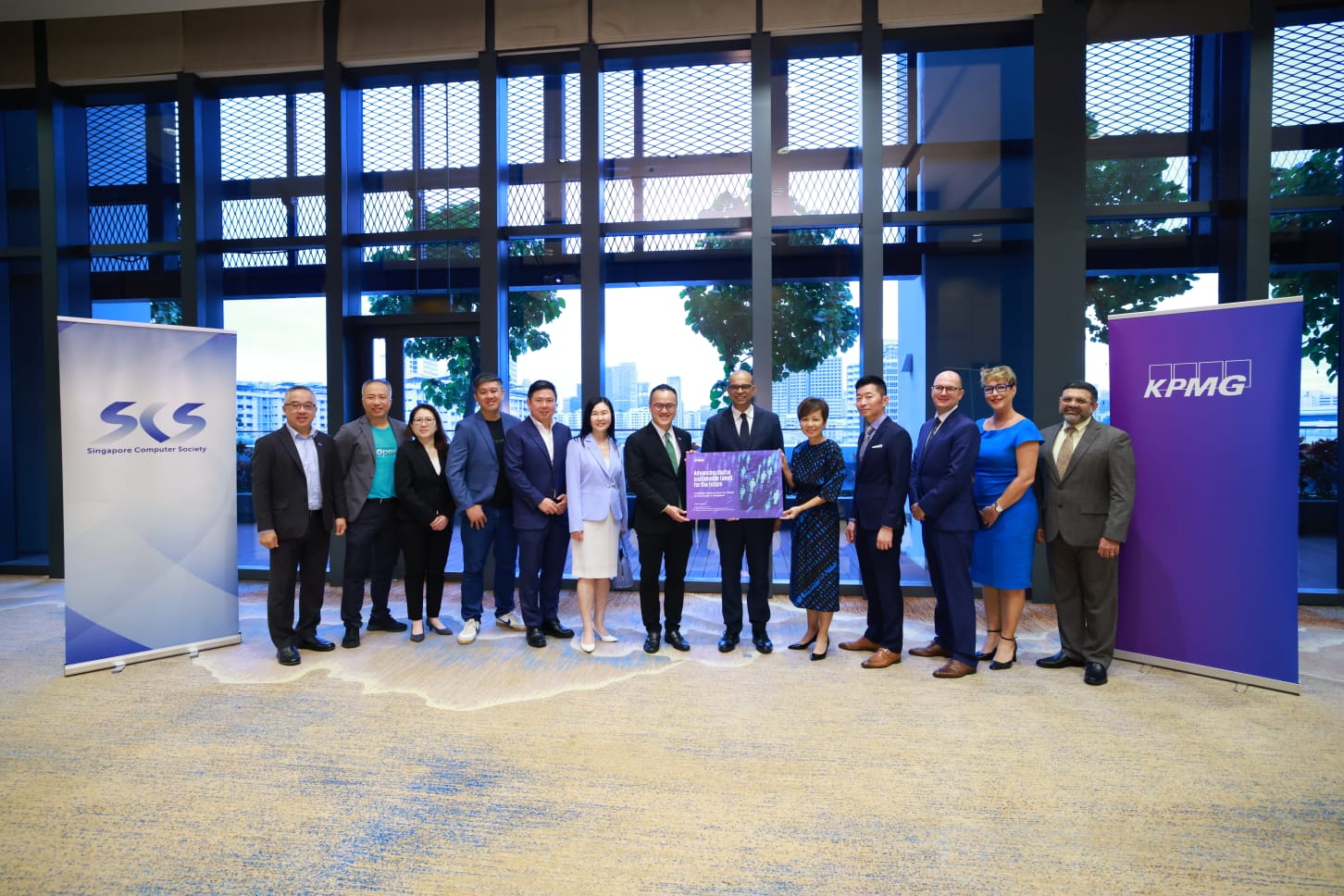KPMG in Singapore Introduces Strategic Guide to Boost Digital Talent and Inspire Green Innovation
SINGAPORE - Media OutReach Newswire - 24 January 2025 - KPMG in Singapore (KPMG) has launched a strategic guide, Advancing Digital Sustainable Talent for the Future, to support local businesses in developing digital talent while embedding sustainability into their operations.
Created with contributions from the Infocomm Media Development Authority of Singapore (IMDA) and the Singapore Computer Society (SCS) Sustainable Tech SIG, the guide is closely aligned with national priorities such as the Forward Singapore exercise and the Singapore Green Plan 2030.

Mr Francis Lee, SCS Executive Director
Mr Benjamin Soh, Sustainable Tech SIG, Committee Member
Ms Ang Guat Ling, Sustainable Tech SIG, Committee Member
Mr Kenneth Ng, Vice-Chairman, Sustainable Tech SIG, Committee
Joey Tan, Chairman, Sustainable Tech SIG, Committee
Lim Bee Kwan, Vice-President, SCS Executive Council
Sam Liew, President, SCS Executive Council
Dr Janil Puthucheary, Senior Minister of State, Ministry of Digital Development and Information of Singapore
Lee Sze Yeng, Managing Partner, KPMG in Singapore
Lyon Poh, Partner, Head of Corporate Transformation, KPMG in Singapore
James Wilson, Partner, Technology Consulting
Nicki Doble, Principal Advisor, Corporate Transformation, KPMG in Singapore
Dr. Deven Chhaya, Partner, Infrastructure Advisory, KPMG in Singapore
The guide highlights how many businesses already possess essential digital talent – such as AI specialists, software developers, and network engineers – and offers actionable strategies to upskill them for evolving technological demands. It also advocates for businesses to adopt 'Green by Design' principles, where sustainability is built into core operations and workforce strategies from the start, rather than being treated as an afterthought.
This guide seeks to equip businesses with insights to plan ahead, offering observations of the current landscape, guidance on incorporating sustainability into business strategies, and actionable recommendations to address digital and green priorities. It supports Singapore's vision of fostering a skilled workforce ready to leverage AI to drive sustainable innovation and long-term economic resilience.
Lyon Poh, Partner and Head of Corporate Transformation at KPMG in Singapore, remarked, "The green transition is a strategic inflection point for Singapore businesses. To succeed, companies must embed sustainability into their core strategies, not as an afterthought, but as a foundation for innovation and growth. By remapping the mindsets and skillsets of their existing workforce, leveraging digital talent to drive green innovation, and aligning with national frameworks such as the Green Plan 2030, businesses can transform challenges into opportunities. Practical steps include investing in energy-efficient technologies, redesigning operations for circularity, and collaborating across sectors to scale impactful solutions. Singapore's strong policy environment and tech-capable workforce uniquely position it to lead in this space, creating economic value while ensuring long-term resilience. Businesses that act decisively now will not only secure a competitive edge but also contribute meaningfully to Singapore's sustainable growth story."
Joey Tan, Chairman, SCS Sustainable Tech SIG, said: "For a successful sustainability transformation, practitioners need to combine specialised knowledge with multidisciplinary skill sets. Green skills, including those related to green software, are essential for building a sustainable future and supporting Singapore's transition to a resource-efficient society."
Strategic Guide Overview – Driving Green Transformation
The guide outlines four key focus areas to help businesses succeed in integrating digital and green priorities:
1. Landscape Analysis
Examines Singapore's digital and green initiatives while addressing global commitments like the Paris Agreement and Sustainable Development Goals. Identifies workforce gaps and proposes tailored solutions to improve alignment between talent development and sustainability strategies.
2. "Green by Design" Principles
Inspired by Singapore's "Secure by Design" framework, these principles advocate embedding eco-conscious practices early in procurement, systems development, and operations, ensuring sustainability underpins all processes.
3. Digital Talent Roadmap
Offers a clear framework for businesses to upskill existing digital roles with emerging green competencies. For example, software engineers can optimise algorithms for energy efficiency, while network specialists can architect sustainable systems. This roadmap is designed to support Singapore's Skills Frameworks.
4. Recommendations for Businesses
Practical steps include fostering a culture of green innovation to seek competitive advantage, advancing cross-sector collaborations to scale sustainable solutions and aligning processes with national initiatives like the Singapore Green Plan 2030.
Strategic Imperatives for Businesses
To seize the opportunities presented by the green economy and AI, Singapore businesses must act boldly. Key imperatives include:
- Embedding Sustainability Across Functions
- Investing in Green Innovation
- Uplifting and Leveraging Talent
- Leading with Purpose
A Wider Economic and Social Vision
The green economy has far-reaching implications. Its benefits include:
- Economic Evolution
- Global Competitiveness
- Social Equity
A Call to Action
The guide emphasises that the challenges posed by the green transition offer unprecedented opportunities for growth and leadership. By upskilling workforces, embedding Green by Design methodologies, and leveraging existing digital capabilities, businesses can remain competitive and contribute meaningfully to national and global sustainability goals.
KPMG's strategic guide provides a roadmap to help enterprises lead in the green transition by making sustainability a core pillar of their operations and talent strategies. Download the guide here to take the first step in driving innovation while building a sustainable future.
Hashtag: #KPMG
The issuer is solely responsible for the content of this announcement.
About KPMG in Singapore
KPMG in Singapore is part of a global organization of independent professional services firms providing Audit, Tax and Advisory services. We operate in 142 countries and territories with more than 275,000 partners and employees working in member firms around the world. Each KPMG firm is a legally distinct and separate entity and describes itself as such. KPMG International Limited is a private English company limited by guarantee. KPMG International Limited and its related entities do not provide services to clients.

















